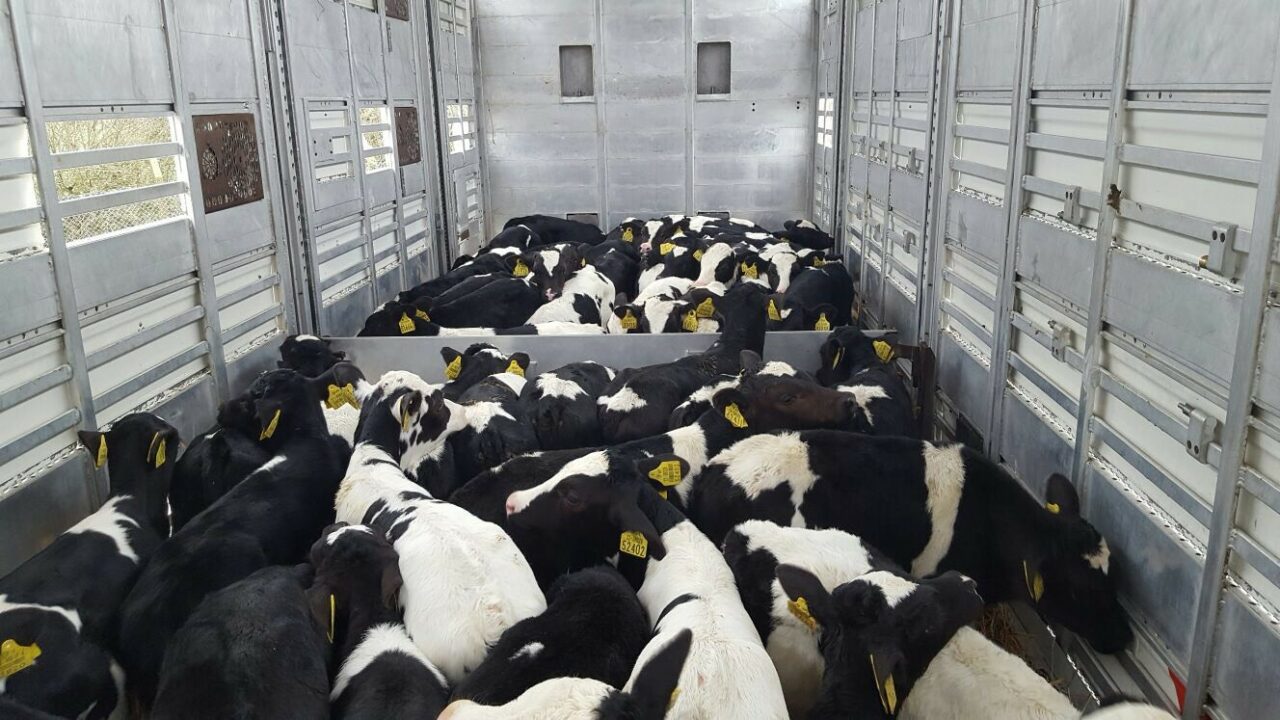Lawyers for the European Commission are currently examining a complaint relating to claims that Ireland recently breached regulations regarding rest stops for unweaned calves being exported to Europe.
A spokesperson for Health, Food Safety and Energy Union projects at the European Commission confirmed to AgriLand that the formal complaint was recently lodged by four animal welfare organisations.
“The European Commission received the complaint which is currently being examined by our lawyers before deciding on the next steps,” the spokesperson said in a statement.
The complaint follows an investigation by Dutch NGO and animal welfare charity, Eyes on Animals, which alleges that, last March, “several Irish trucks” travelling from Rosslare “did not stop” at designated rest stops in Cherbourg, France – but instead continued to travel for an additional five hours.
A spokesperson for Compassion in World Farming Ireland (CIWF Ireland) – an animal charity that also contributed to the complaint – said: “This [journey] meant the calves were travelling for 30 hours with no rest or feed.
“There were also only three attendants in charge of 17 trucks – the other drivers had to go to Cherbourg via a different means as there was no room for them on the ferry,” the group claims.
Following this incident, a complaint was submitted to Minister for Agriculture, Food and the Marine Michael Creed by Compassion in World Farming, Eyes on Animals, Germany’s Animal Welfare Foundation and French animal protection charity L214.
Minister Creed responded saying that they conducted an investigation and penalties were given to the drivers who did not stop in Cherbourg.
However, the groups alleges that this is “not the first time” these breaches have been uncovered.
“A similar complaint was submitted by Compassion in World Farming in 2010 – a further letter was sent to the minister asking for more detail on how many drivers were penalised and by how much.
“There was also a query in relation to a claim by one of the drivers that the journey logs had been approved by the department,” said the spokesperson.
The CIWF Ireland spokesperson says that “as no response” was given by Minister Creed a formal complaint was submitted to the European Commission by CIWF in conjunction with the three groups named above.
‘Poor weather conditions’
In a statement to AgriLand, a spokesperson for the Department of Agriculture, Food and the Marine outlined that the department is the competent authority in relation to the application of national and EU legislation in respect of animal transport.
“The vast majority of transports of livestock from Ireland to various destinations to date in 2018 have taken place without incident and in full compliance with the relevant requirements of the EU and national legislation.
The poor weather conditions that persisted throughout the winter – allied to the extreme conditions that resulted from the snow in early March – led to some disruption and pressure on the transport arrangements for calves to the continent.
“On some occasions this spring the two control posts (used for resting and feeding calves during transport) nearest to Cherbourg were full.”
The spokesperson said that on those occasions the instruction to transporters is to use the next nearest available control post to rest and feed calves.
In a small number of cases, however, trucks travelled on to the further away control post – even though some capacity did exist at the nearer control post.
“Penalties have been imposed in those identified cases in line with the powers outlined in SI 675 of 2006,” the spokesperson added.
The department representative highlighted that no penalties have been imposed on drivers or transporters who have complied with the requirements of the transport legislation.
New Instructions
The department also stated that next year it will insist that all Irish calf exporters use only Qualivia 2 and Pignets – the control posts nearest Cherbourg.
“Qualivia 1 is no longer acceptable as a control post for calves arriving from Ireland in view of the significant infrastructural improvements that have taken place in the two control posts nearest Cherbourg.
“These new instructions are being communicated to livestock exporters,” the spokesperson stated.
